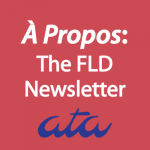
 To make our Continuing Education Series Podcast more accessible and searchable for FLD members and the general public, we are now offering transcriptions of our episodes right here on À Propos. Many thanks to our volunteer transcriptionists, who are credited at the bottom of each transcription. If you’re interested in helping us transcribe podcast episodes, email divisionFLD [at] atanet [dot] org.
To make our Continuing Education Series Podcast more accessible and searchable for FLD members and the general public, we are now offering transcriptions of our episodes right here on À Propos. Many thanks to our volunteer transcriptionists, who are credited at the bottom of each transcription. If you’re interested in helping us transcribe podcast episodes, email divisionFLD [at] atanet [dot] org.
HOW TO LISTEN TO THE ORIGINAL EPISODE
SOUNDCLOUD: You can listen to or download Episode 29 and all previous episodes on Soundcloud here.
ITUNES: This episode and all previous episodes are available on iTunes here. You can subscribe or listen online. Like what you hear? Rate us and review us! It really helps get the word out.
Episode 29: ATA 2023 Conference – French Sessions
Andie Ho: Hello, hello! I’m your podcast host, Andie Ho, and for this episode we don’t have any guests. Well, we sort of have one. You’ll find out. But what I want to do this time is talk about the French conference sessions that are going on at ATA 64 in October, October 25th through 28th of this year in Miami, Florida. Now, we’ve got six sessions this year that are labeled as French or having to do with French. Four of them are the traditional hour-long sessions that we all know and love. But this year there are some new formats for some of the sessions at ATA. Some of them are 30 minutes long and we have one of those for our French talks. And then we have one that is 15 minutes and that’s called a MicroTalk. There’s going to be some MicroTalks sprinkled throughout ATA that are 15 minutes and they’re supposed to be something like a TED Talk. I’m very excited about this new format. It’s going to be interesting to see how it goes. And I’m very pleased that the Board and other people organizing the ATA are innovating and trying new things. Now, for the first session, I will let one of the speakers herself tell you what it’s all about.
Liza Tripp: Bonjour, tout le monde! My name is Liza Tripp, and I’m a certified French-to-English translator. I’ll be presenting with Denise Jacobs at this year’s 64th ATA conference in Miami on Thursday, October 26th at 10:45 a.m. Our session’s entitled “Est-ce Que Ça Cloche?! Coping With Culture Clash in French to English Fashion Translation.” In this session, we’ll be delving into French fashion language and in particular, noticing how terms in this sector often fluidly evoke not just concrete fashion words, but more abstract and culturally charged concepts such as art-making legacy. And English? Well, not so much. Using recent translations from fashion and gallery exhibits, fashion books, and marketing materials we’ll learn to identify where linguistic gaps can signal cultural gaps and how we can add back just a bit of that cultural je ne sais quoi when translating these materials into English. This year we don’t have the last session on the last day, so I hope to see everyone alert and energetic in Miami. À tout!
Andie Ho: Now, of note, Liza and Denise’s session is also labeled as “Book and Literary Translation,” “Localization,” and “Other T&I Topics.”
Now, the next session we have is called “Chemical Name, Chemical Structures: What’s a Translator to Do?” And it’s being put on by Matthew Schlecht. It is from 1:45 p.m. to 2:45 p.m. on Thursday. And here’s the description. “Translators and interpreters encounter chemical names in many subject matter areas, including medicines, cosmetics, and food additives. They can appear in news items, school assignments, and everyday conversations. There are proper official names for all of them, but these are honored mainly in the breach. Finding the right chemical name to fit the register of a document is a challenge, but sometimes even getting the correct spelling is daunting. This session will cover the translation of chemical names from German, French, Japanese, and Spanish into English, describe strategies and approaches, and show how to capture and generate chemical structures for inclusion.”
Now it’s also labeled as “Science and Technology T&I,” “Medical T&I,” and “German,” “Japanese,” and “Spanish.”
The next one is from 2 to 3 p.m. on Friday. And it is called “Québec: The Gift That Keeps on Giving.” The speaker is Claire Kusy. I’m not positive how to pronounce her name, so pardon me, Claire, if I mispronounced it. And here’s the description. “The practice of translation in the Francophone province of Quebec provides a fertile landscape in North America. Quebec is at the crossroads of so many fascinating elements: history, culture, politics, law and, of course, language.
From a translator’s perspective, the unique Quebec context and experience makes the profession a highly stimulating one, reaffirming the translator’s role as more than a simple conduit. Through the lens of legal translation (the speakers area of expertise), this session will delve into some of the more intriguing aspects of a Quebec translator’s practice.”
This one is labeled as “Legal T&I” in addition to “French.”
All right. The next one runs from 3:30 to 4 p.m. This is one of our half-hour sessions and it takes place on Friday. It is called “Le Repas des Fauves to The Beasts’ Feast: A Translator’s Linguistic and Cultural Feat.” Now, interestingly, no speaker is listed, so I guess it’s a mystery. We’ll find out when we get there. Here’s the description. “Julien Sibre’s play Le Repas des Fauves describes the conflictual interaction between friends who are trapped in a Parisian apartment during the German occupation of France. How does the English translator mediate between the two texts to convey the linguistic and cultural essence of a psychological drama deeply rooted in specific historical and psychological circumstances? The speaker will discuss the challenges she experienced while translating Sibre’s work into English to demonstrate that compromise is often the only strategy available to the literary translator.”
Unsurprisingly, this one is also marked as “Book and Literary Translation” and sounds very interesting.
The next one is the only ATA MicroTalk labeled as French, and it runs from 8:50 a.m. to 9:05 a.m. on Saturday. It is called “Civic Engagement in the Translation Classroom: A Virtual Exchange Experiment.”
And the speaker is Kathleen Loysen. “The speaker will discuss a semester-long virtual exchange between two groups of university students of French to English translation (in France and the U.S.). In these virtual classes, students were guided through a project involving research on the history of slavery in both New Jersey and Bordeaux and its relationship to the Black Lives Matter movement. Students performed research, translated documents, and created content for a video documenting their experience. Students also discovered how seemingly universal notions of democracy, citizenship, and diversity have evolved in both countries. The session will be delivered in English with selected examples in French that will be translated and explicated.”
This session is labeled as an “ATA MicroTalk,” of course, as well as “Educational T&I” and “T&I Education and Training.”
And last but not least, from 4 to 5 p.m. on Saturday, we have a session called “What’s Cooking: An Introduction to Culinary Translation” by Olivia Singier. “Over the past few years, interest in food and cooking has become more popular thanks to globalization and the expansion of food-related media. How difficult could it be to translate menus and cookbooks? Chicken with pasta and tomato sauce—that sounds easy enough to translate! The truth is, it’s anything but. Using examples from past projects, the speaker will discuss the various techniques used to translate food and specialized terms in cookbooks. In this interactive session, attendees will receive tips on how to develop their skills and perhaps add culinary translation to their specialties.”
This one is marked as “Book and Literary Translation” and “Other T&I Topics.”
Now, those are the six sessions that are labeled as French for this year’s ATA conference. But of course, there are going to be so many more sessions. On a personal note, although we want to support our fellow French speakers, there are so many more sessions to check out. And in fact, I encourage you to go to ones that you think have nothing to do with your career or your language or your specialty. Some of the most interesting sessions I’ve ever been to are ones that have nothing to do with what I do on a daily basis. And honestly, I didn’t really get anything out of them on a professional level, but they were just so much fun and so interesting. And you get to meet new people outside of your usual circles that you might not meet in other circumstances. Yeah, it’s really interesting and there’s so much to explore, especially if you’ve been to ATA number of times now. I’m not going to say it gets “samey,” but you know you’re comfortable, and if you’re looking for something new and a new way to stretch yourself at the conference in a way that you haven’t done in a while, it’s definitely a quick way to do it. Anyways, I will see you all soon and I hope you enjoy the rest of your summer.